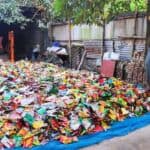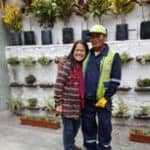Five Key Building Blocks for Sustainable, Inclusive Recycling Systems
Over the past decade, recycling in low- and middle-income countries has benefited from the implementation of inclusive recycling systems that incorporate the work of the informal sector (waste-pickers). Inclusive recycling systems produce value for many stakeholders in that they simultaneously diminish greenhouse gas emissions by keeping waste material out of dumpsites and provide livelihood opportunities to people living in extreme poverty.
In 2016, the MIT Practical Impact Alliance (PIA), an MIT D-Lab program, formed a working group* to explore strategies for effectively developing inclusive recycling systems. Over the course of a year, in monthly case presentations and discussions, the group examined case studies and developed building blocks for implementing these kinds of systems in India, Africa and Latin America. The working group culminated in the publication of a guide for practitioners that includes five key steps for developing inclusive systems, nine case studies and a tool for promoting recycling systems that benefit all stakeholders.
MAPPING THE ECOSYSTEM STAKEHOLDERS
In order to identify best strategies for building inclusive recycling systems, working group members began the process of developing best practices by identifying the stakeholders that could receive value from an inclusive recycling system. In total, the members identified seven key groups.
Waste-pickers: Informal collectors of recyclable material who often work in dumpsites or streets, gathering, sorting and selling material – most often to middlemen, but also to the recycling industry.
Residents: People living in the town, city or region where an inclusive system is being implemented.
Municipal and national governments: The governmental body within the region or country where the system is being implemented.
Non-governmental organizations (NGOs): Organizations that work independently of the government to help develop inclusive programs by supporting waste pickers or offering environmental services.
Local anchor institutions: Large organizations and businesses, such as hospitals and universities, that generate waste.
Recycling businesses: Enterprises that pay for recyclable material and either transform those materials into new products or process the material and sell it to local and global buyers.
Multinational corporations: Multinational corporations that bring needed products to low- and middle-income markets and also generate a significant amount of waste.
FIVE BUILDING BLOCKS FOR INCLUSIVE RECYCLING SYSTEMS
In each of the strategies identified below, the working group paid particularly close attention to how each building block could potentially provide opportunities for waste-pickers to either build their own cooperatives or businesses, or participate in the development of social enterprises.
The five building blocks are:
Build a coalition that enables social businesses and inspires action
Corporations must establish unified regional associations to responsibly manage their packaging and products once they enter the waste stream. Based in Chile, TriCiclos (below) is a scaling social business that brings together multinational corporations, municipal governments and waste-pickers to provide companies concrete guidance on how they can advance their inclusive recycling goals.
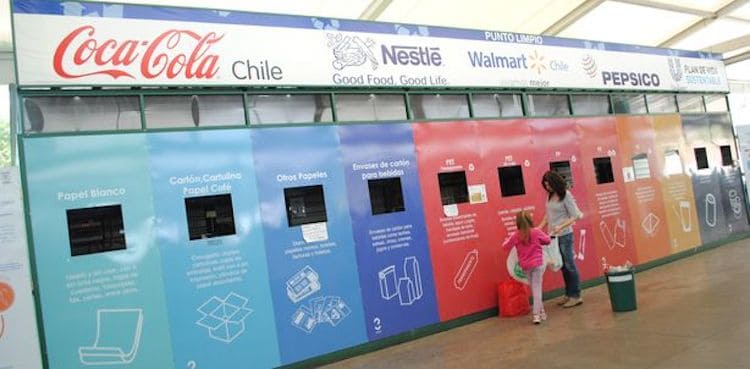
Work with government to create an inclusive policy framework
Laws must be enacted that require local producers to responsibly manage their waste packaging, and require municipalities to incorporate the informal sector into formal solid waste management systems. Inspired by Brazil’s National Solid Waste Policy, Danone has set an ambitious goal of enabling second-life opportunities for 100 percent equivalent by weight of the plastic packaging it produces. Danone moves toward this goal by engaging and supporting waste-picking cooperatives (below).
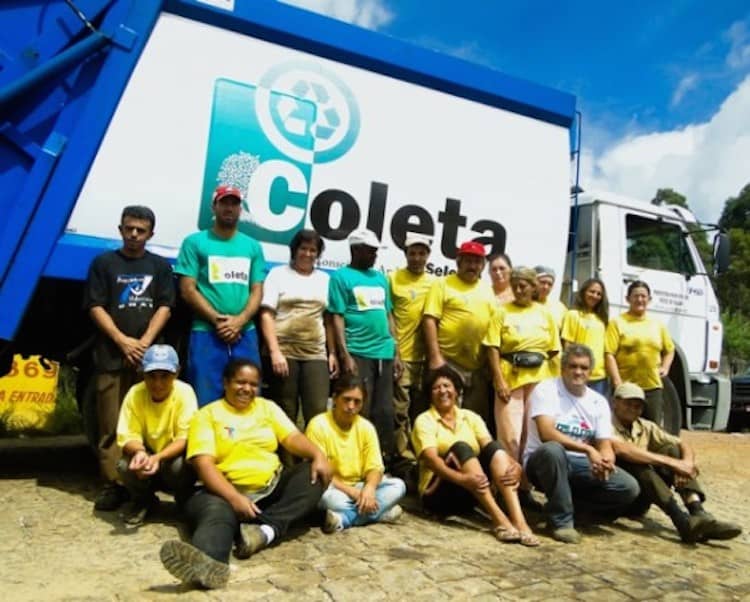
Launch a public awareness campaign
Campaigns must be launched to sensitize community members and other stakeholders about the environmental and public health benefits of recycling waste material, and the need to properly segregate material. Wecyclers (below), an innovative household recycling service using a fleet of low-cost cargo bikes, recognized that getting through to its audience – low-income households in Lagos, Nigeria, that tend not to receive recycling services – would require a face-to-face approach. For this reason, their representatives spend time in key neighborhoods, having one-on-one conversations with residents to explain how their company’s services work and why residents should use them.
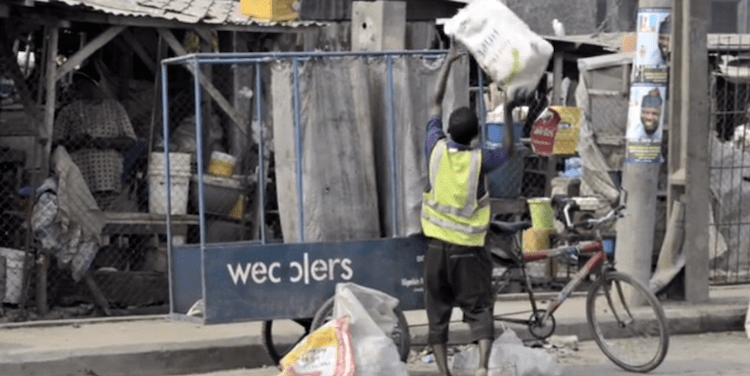
Organize and network the waste-pickers
Waste-pickers should be offered the opportunity to become organized in unions or associations and provided with leadership training to understand that they have a right to participate in the formal solid waste management system and that strategies exist for them to exercise that right effectively. Kagad Kach Patra Kashtakari Panchayat (KKPKP, below) was formed in 1993 as the world’s first trade union of waste-pickers. Its mission was to put pressure on authorities and shape a solid waste management model that incorporated the work of waste pickers in the city of Pune. Fifteen years later, KKPKP created a single-waste cooperative, SWaCH, that won a municipal contract to provide door-to-door collection.

Support the development of waste-picker social enterprises
Waste-pickers should be provided the opportunity to launch small- and medium-sized enterprises. They can then be offered business management training and related support to allow them to grow successful enterprises that are fully incorporated into the formal solid waste management system. An MIT D-Lab curriculum that supports waste-pickers in their efforts to build businesses was first developed to support the creation of a recycling cooperative in Bluefields, Nicaragua (below). The curriculum uses a co-design methodology to build businesses with the informal sector over a period of one year, followed by a second year of business coaching.
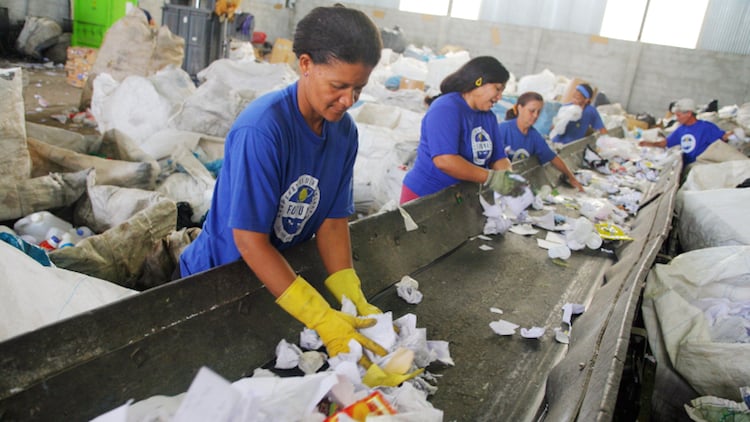
A MOBILE APP TO SUPPORT INCLUSIVE RECYCLING
The working group used a co-design process led by the BoP Innovation Center (BoP Inc.) to design a digital application that could improve waste-pickers’ livelihood while adding value for other stakeholders in the recycling ecosystem. Through an iterative co-design process the group identified two solution spaces to develop and test. The first concept uses an app to enable waste-picker coops to network and agglomerate materials to increase volume, yielding greater bargaining power and earnings. The second concept is a functionality to optimize links between residents and waste-picking cooperatives for improved efficiency and impact.
For more information on the app and the inclusive recycling framework please feel free to explore the full publication. We hope you will enjoy it as much as we enjoyed developing it. We look forward to hearing your thoughts and suggestions for how we can make it even better.
*The working group on inclusive recycling was co-led by D-Lab, Johnson & Johnson and BoP Inc. It included representatives from multinational companies Ajinomoto, Danone and Johnson & Johnson; the OCP Phosboucraa Foundation (corporate); the Mellon Foundation (an international nonprofit); and social ventures Wecyclers, TakaTaka Solutions and TriCiclos. D-Lab collaborated with BoP Inc. on developing the final publication.
Libby McDonald teaches D-Lab: Gender and D-Lab: New Economies at MIT D-Lab.
Photos courtesy of MIT D-Lab
- Categories
- Environment, Social Enterprise, WASH
